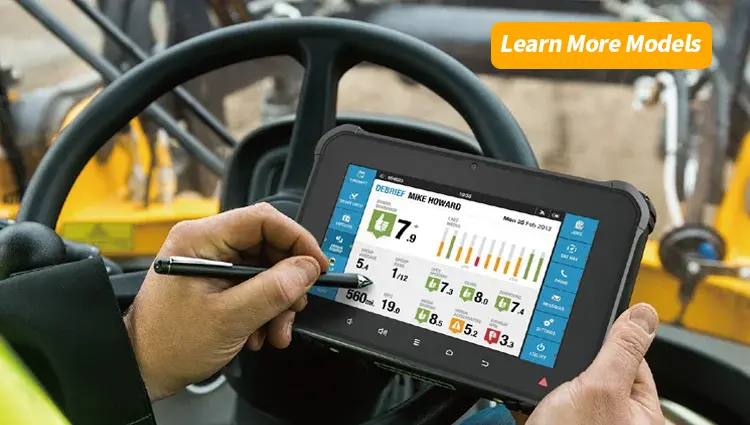The Ultimate Guide to Windows Rugged Handheld Devices
In today’s fast-paced environment, businesses require robust and reliable tools to maintain efficiency in challenging conditions. Windows rugged handheld devices have emerged as a critical asset, providing unparalleled durability and performance. These devices are designed to withstand extreme environments while offering the functionality of a full-fledged computing system. This guide will explore the features, benefits, and key considerations when selecting a Windows rugged handheld device.
Key Features of Windows Rugged Handheld Devices
Durability and Ruggedness
Windows rugged handheld devices are engineered to endure harsh conditions, including extreme temperatures, moisture, dust, and mechanical shocks. They typically meet or exceed military standards such as MIL-STD-810G, ensuring they can handle drops, vibrations, and environmental stressors. The robust construction often includes reinforced housings and sealed enclosures to protect internal components.
High-Performance Processing
Equipped with powerful processors, these devices offer seamless multitasking capabilities. They support complex applications and data-intensive tasks, essential for field operations. The integration of the latest Intel or ARM-based processors ensures efficient performance, even under demanding workloads.
Superior Display Quality
The screens of Windows rugged handheld devices are designed for optimal visibility in various lighting conditions. Features such as high-brightness displays, anti-glare coatings, and scratch-resistant Gorilla Glass enhance usability outdoors and in challenging environments. Multi-touch capabilities and stylus support further improve interaction and precision.
Comprehensive Connectivity Options
These devices come with a wide range of connectivity features, including 4G LTE, Wi-Fi, Bluetooth, and GPS. They also offer multiple I/O ports such as USB, HDMI, and Ethernet for versatile peripheral integration. This connectivity ensures that users remain linked to critical systems and data, regardless of their location.
Long Battery Life
Battery performance is crucial for field operations. Windows rugged handheld devices often feature high-capacity, hot-swappable batteries, enabling extended usage without frequent recharging. Some models also support fast-charging technologies and power-saving modes to maximize operational time.
Enhanced Security
Security is paramount in rugged environments where data breaches can be particularly damaging. These devices typically include hardware-based security features like TPM (Trusted Platform Module) and support for advanced encryption protocols. Integration with Windows security features, such as BitLocker and secure boot, provides comprehensive protection against unauthorized access.
Benefits of Using Windows Rugged Handheld Devices
Increased Productivity
The robust design and high-performance capabilities of Windows rugged handheld devices minimize downtime caused by equipment failure. Their ability to run complex software applications and connect to enterprise systems in real-time enhances productivity and operational efficiency.
Reduced Total Cost of Ownership (TCO)
While the initial investment in rugged devices may be higher than standard consumer-grade alternatives, the reduced need for repairs and replacements over time results in a lower TCO. Their durability and reliability translate into fewer disruptions and less frequent equipment turnover.
Enhanced Data Collection and Management
Windows rugged handheld devices support various data collection methods, including barcode scanning, RFID, and imaging. This versatility is crucial for sectors like logistics, warehousing, and field service, where accurate data capture and management are vital.
Adaptability Across Industries
These devices are versatile tools that can be customized for different industries, including logistics, manufacturing, healthcare, and public safety. Their adaptability makes them suitable for a wide range of applications, from inventory management to field inspections and emergency response.
Key Considerations When Choosing a Windows Rugged Handheld Device
Environmental Requirements
Evaluate the specific environmental conditions in which the device will operate. Consider factors like temperature ranges, exposure to moisture or dust, and potential physical impacts. Choose a device with appropriate IP ratings and MIL-STD certifications to match these conditions.
Application Needs
Determine the software and applications that the device needs to support. Ensure compatibility with the operating system and hardware capabilities of the rugged handheld device. Consider the need for specialized features like GPS, barcode scanning, or extended battery life.
Ergonomics and Usability
The design and ergonomics of the device should facilitate ease of use in the field. Features such as ergonomic grips, weight distribution, and interface design can impact user comfort and efficiency. Look for devices with customizable buttons and intuitive interfaces.
Support and Warranty
Check the manufacturer’s support and warranty policies. A comprehensive warranty and robust customer support can mitigate risks associated with hardware failures and ensure swift resolution of issues.
Suggested Diagram
A[Environmental Requirements] --> B[Temperature Range]
A --> C[Moisture/Dust Resistance]
A --> D[Physical Impact]
B --> E[Choose Device with IP/MIL-STD Certification]
C --> E
D --> E
F[Application Needs] --> G[Software Compatibility]
F --> H[Hardware Capabilities]
G --> I[Device Selection]
H --> I
J[Ergonomics and Usability] --> K[Design]
J --> L[Weight]
J --> M[Interface]
K --> N[Device Usability]
L --> N
M --> N
O[Support and Warranty] --> P[Manufacturer's Policies]
O --> Q[Warranty Coverage]
P --> R[Risk Mitigation]
Q --> R
Conclusion
Windows rugged handheld devices offer a robust solution for various industrial applications, combining durability, high performance, and extensive connectivity. When selecting a device, consider the specific environmental challenges, application requirements, ergonomic factors, and support options. With the right rugged handheld device, organizations can enhance productivity, reduce costs, and improve operational efficiency in demanding environments.
By understanding these critical aspects, businesses can make informed decisions, ensuring their rugged handheld devices meet the demands of their specific use cases while delivering long-term value.








